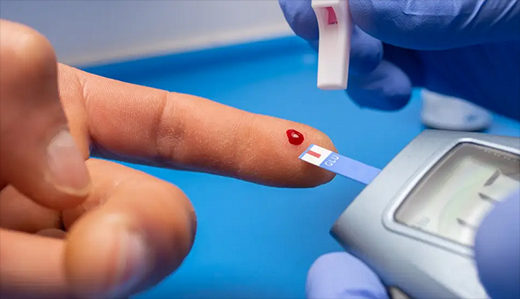
Covid-19 patients with high blood sugar at higher risk of death, study suggests
Mangalore Today News Network / Yahoo
New Delhi, Nov 25, 2020: Ever since the beginning of the COVID-19 pandemic, a number of underlying diseases have been associated with risks of severe disease, hospitalisation and even death.

Diabetes is one of the key comorbidities associated with adverse COVID-19 outcomes, and many studies have thrown light on the various mechanisms involved in disease progression that make someone with diabetes more susceptible to severe symptoms and complications.
Diabetes, diabetic retinopathy and COVID-19
A study published in Diabetology in July 2020 revealed that COVID-19 patients with higher levels of fasting blood sugar are at risk of death within 28 days of getting infected, primarily due to older age and cerebrovascular diseases. The study data also showed that patients with fasting blood sugar levels less than 6.1 mmol/L (110 mg/dL) had a lower risk of severe outcomes due to COVID-19.
A recent study published in Diabetes Research and Clinical Practice suggests that COVID-19 patients with both diabetes and diabetic retinopathy had a five-fold increased risk of intubation. Diabetic retinopathy is a complication of diabetes in which the small blood vessels of the eye are damaged, causing mild eye symptoms and blindness when left uncontrolled. Damage to the blood vessels is anyways linked to severe COVID-19 outcomes but this was the first study to link diabetic retinopathy with intubation during hospitalisation due to COVID-19.
High blood sugar in non-diabetic patients
While the link between diabetes and severe COVID-19 outcomes is repeatedly highlighted by studies, it’s important to note that high blood sugar levels in non-diabetic patients can also lead to complications and even death. A new study published in the Annals of Medicine suggests that abnormally high blood sugar levels (hyperglycemia) at the time of admission are a strong predictor of worse outcomes and mortality in non-critical hospitalised COVID-19 patients regardless of any history of diabetes.
Previous research, including one published in the Journal of Clinical and Diagnostic Research in 2014, indicates that not all patients with hyperglycemia are diabetic and that this is a very important consideration people in medicine and surgery have to take during their regular practice. Underlying medical conditions like polycystic ovary syndrome (PCOS) and Cushing’s syndrome can cause hyperglycemia and so can stress, injury, trauma, infections like pneumonia and the use of certain medications like steroids and diuretics.
Hyperglycemia and severe COVID-19 outcomes
This type of hyperglycemia can also cause blood vessel damage and is just as likely to lead to severe complications. Add COVID-19 to the mix and the results are naturally likely to be graver if hyperglycemia is left untreated in non-diabetic patients. This is the reason why the researchers behind the new study strongly recommend that all patients hospitalised due to COVID-19 must be screened (and treated if necessary) for hyperglycemia to prevent COVID-19 complications.
To prove this connection between hyperglycemia and adverse COVID-19 outcomes, the researchers studied 11,312 patients hospitalised in centres across Spain and analysed their risk of all-cause mortality. Only 18.9 percent of these patients (2,128) had diabetes at the time of admission. Around 20.4 percent patients (2,289) died during hospitalisation, and 15.7 percent of these patients had blood glucose levels less than 140 mg/dL, 33.7 percent had readings between 140-180 mg/dL and 41.1 percent had blood glucose above 180 mg/dL. Blood glucose levels below 140 mg/dL are considered to be within the normal range.
The researchers found that the cumulative probability of mortality was significantly higher in patients with hyperglycemia - whether they had diabetes or not - as compared to those with normal blood sugar levels. Hyperglycemia was also associated with a greater requirement of mechanical ventilation and admission to the intensive care unit. The findings of this study, therefore, indicate that screening all COVID-19 patients for hyperglycemia at the time of hospital admission can help doctors provide better care and treatment to minimise all-cause mortality as well as complication risks.